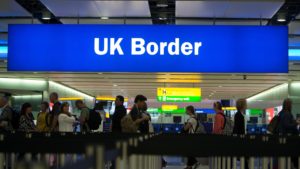UK headed for a migration-cuts recession
Slashing Britain’s immigration intake to less than 100,000 a year as the UK Conservative government has promised will harm the country’s economy and could trigger a recession, new research says.
A new report by the UK’s Centre for Economics and Business Research said that a reduction in net immigration to below 100,000 a year, after Brexit, could reduce the size of the UK economy by up to 3 per cent by 2025.
And things might get worse farther into the future, the report said.
 It said the move could trigger a rise in public borrowing by up to £15.6bn a year by the middle of the next decade.
It said the move could trigger a rise in public borrowing by up to £15.6bn a year by the middle of the next decade.
![]()
Estimates about the economic effects of immigration are disputed, but most economists accept that recent migrants to the UK have contributed to the economy and public finances and agree that cuts to immigration will reduce growth.
Douglas McWilliams, founder of Cebr and author of the report, argues that immigration eases bottlenecks in the economy, boosts diversity and creativity and that both have important positive effects on productivity and growth rates.
Mr McWilliams says faster growth boosts wages and this will have a significant effects on the potential of the UK economy in the medium term.
“If the UK cuts off migration without making adjustments to boost productivity, especially productivity in the public sector, the scale of the economic damage could be huge,” Mr McWilliam said.
If the UK cuts off migration without making adjustments to boost productivity, especially productivity in the public sector, the scale of the economic damage could be huge
He estimates that by 2030, the hit to the economy could be between 4.1 and 5.7 per cent. With fewer people in Britain, gross domestic product per person would not be hit so hard but would still be 1.9 to 2.7 per cent lower than otherwise at the end of the next decade on his estimates.
Similar effects have also been modelled by Professor Jonathan Portes of King’s College London.
Prof Portes says that although the estimates are highly uncertain, the best evidence suggests cutting net immigration will make Britain poorer.
“It is not just a reduction in the size of the economy, but people, on average, will be poorer and this will come with worse public finances,” Prof Portes said.
Another study by the Migration Matters Trust says Prime Minister Teresa May’s plans to cut migration would almost double unemployment in the UK to more than three million.
It says that British workers would be the main losers from lower economic growth caused by the country having fewer people to drive business expansion and, in turn, consumer demand and spending.
The Migration Matters Trust, a cross-party group of politicians, business leaders and trade unionists which encourages an evidence-based debate on immigration, studied the relationship between the migration, unemployment and employment figures over the past 10 years.
It concluded that unemployment would rise from 1.6 million today to 3.1 million if net migration fell below 100,000. It has not stood at that level since the mid-1980s during the Thatcher Government.
According to the study, the employment rate for British citizens – the percentage wanting to work who have jobs – would drop from 75 per cent to 70 per cent, the lowest level for 20 years. The number of jobless people chasing each vacancy would rise from two today to seven.
Meanwhile, the UL’s Office for National Statistics (ONS) estimated long-term net migration to be 248,000 in 2016, down a “statistically significant” 84,000 from 2015.
This has sparked business groups to warn that EU nationals leaving the UK, mean employers risk “losing key members of staff in positions that cannot easily be replaced”.
The net change was caused by an increase in EU citizens leaving the country as well as a smaller fall in people coming to the UK.
The ONS says around 117,000 EU citizens left the UK in 2016, an increase of 31,000 on 2015 and the highest recorded estimate since 2009.
Laurie Nowell
AMES Australia Senior Journalist












